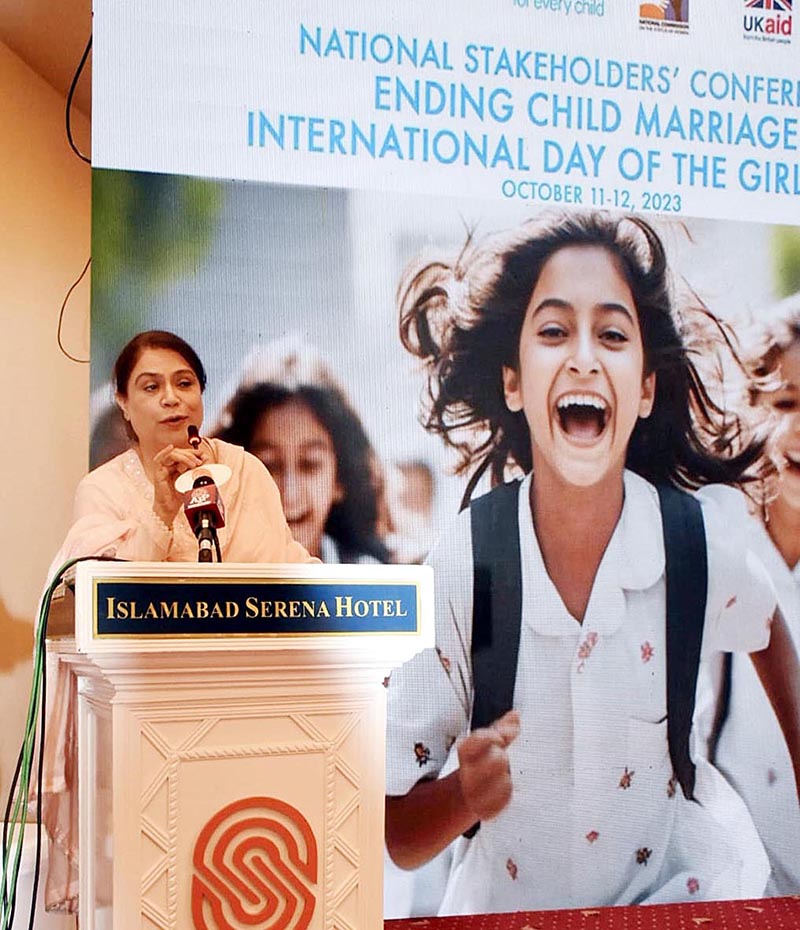By Asim Hussain
ISLAMABAD: Chairperson National Commission on the Status of Women (NCSW) Nilofar Bakhtiar on Wednesday pledged to take forward the agenda of ending child marriage- a menace that is badly affecting many generations- with all her supporting hands to break the heinous cycle of discrimination.
“It was a misfortune that the bill restraining child marriage in the country moved almost six times in the legislature but could not get through,” she regretted.
This bill promises the right to education and health for every young girl but became a failure of our institutions. Nilofar was addressing a two-day National Stakeholders’ Conference on Ending Child Marriage organized by NCSW in collaboration with UNICEF, UNFPA, UN Women, FCDO and UKAid. It was held in connection with international Girl Child Day, marked on October 11. She said that it was a tragedy that millions of girls were out of school in Pakistan due to prevailing social and economic circumstances. They deserved the right kind of atmosphere and the right kind of support from their family and society.
The biggest irony was the difference in the legal age for marriage in all four provinces, demanding immediate attention from policymakers and implementers. She further said that she had a strong faith in civil society; when they stood together, things happened. At this occasion, Laktika Maskey Pardhan, Deputy Country Rep of UNFPA said that the adolescent fertility rate in Pakistan was high at 46 per 1,000 adolescent girls aged 15-19.
The primary school dropout rate was 22.7 per cent, which was one of the highest in the region where 32% of married adolescents (15-19 years of age) experienced gender-based violence. She added that the overall need for this framework was to ensure that proactive measures were put in place that were comprehensive and holistic to prevent eliminate and respond to child marriage, thereby enabling all children to realize full childhood development and the necessary protections. For that, a targeted, collective approach was the only solution to move forward. Daniela Luciana, Chief Child Protection UNICEF observed that leadership and commitment to enacting policies and enforcing laws that protect children were crucial. There was a need for a robust legal framework that not only prohibits child marriage but also ensures accountability for those who violate these laws. Deputy Country Rep UN Women Franklin Okumu said that beyond individuals, families and communities, child marriage had high economic cost.
A national costing study by NCSW and UN Women found that the total cost of child Marriage in Pakistan is $ .8 billion or 0.42% of GDP. Child brides were deprived of their fundamental rights to health including life itself.
Globally complications in pregnancy and childbirth were the leading cause of deaths in girls aged 15-19. He ended his remarks by uttering strong words, “Please don’t mess with my baby girl”. She further said that the timing of this piece of work was opportune as it would lay the ground for securing the support of the new government after elections to advance reforms. Jo Moir Development Director FCDO in her closing remarks said that child marriage was a harmful practice with severe consequences that impact generations and impede equality. The objective of the conference was to build a national framework for Ending Child Marriage after reviewing the inputs from all relevant stakeholders. Following the National Consultation, partners will conduct provincial consultations to discuss at length the action plans during this conference. Later, a girl child Malaika Arif, a student of grade nine in a government school shared her thoughts and dreams with the audience. She presented how she desired to fulfil her ambitions with hard work, innovative ideas and distinctive colors but social patterns and mindsets might become a hindrance in the way of her dreams to be realized. Afterwards, a proposed framework was presented with suggestions to implement in different areas that was followed by a detailed discussion on the health and social consequences of child marriage and ended with an outcome that changed minds, social and behavioural perspective was as essential as legislation in Pakistani society. And it was the only tangible solution to end child marriage in the country.


